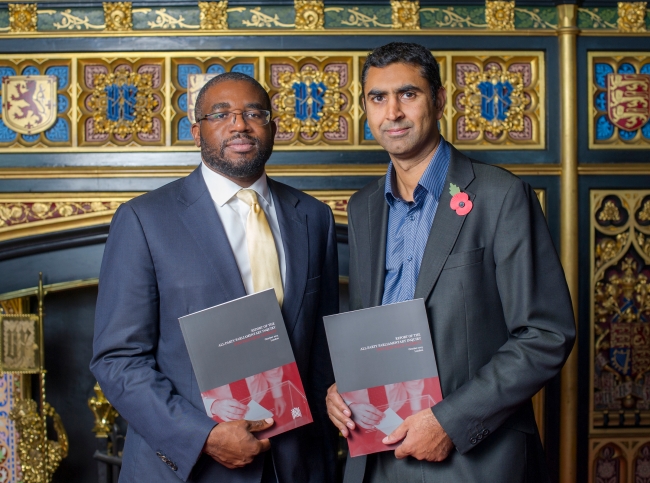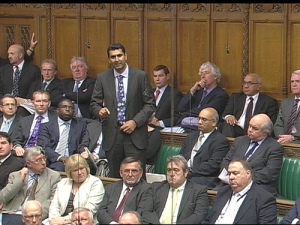http://www.gloucestercitizen.co.uk/Gloucester-MP-Parmjit-Dhanda-pig-s-head-driveway/story-19000517-detail/story.html
I do still get quite a lot of questions about the incident mentioned in the link above. This blog tries to answer those questions here in my own words.

I gave evidence in person to the All-Party Inquiry in to Electoral Conduct, which looked in to abusive behaviour in election campaigns.
The headlines largely focussed on the issue of the pig’s head that was left in my front garden. Although I guess it helped to illustrate a point at the extremes, as did the appalling death threats faced by Tory MP Lee Scott, I wanted to post my written evidence in my own words in a blog when things had settled down a bit, following the inquiry’s publication at Speaker’s House a few days ago.
I think the report was a very worthwhile piece of work and I wanted to put on record my thanks to MPs John Mann, Natascha Engel and Angie Bray in particular, and the members who took evidence. I hope you find my written evidence balanced and more measured than the headlines, but for completeness here is a sample of the reporting too, which is also relevant to the issues that were raised: http://www.theguardian.com/commentisfree/2013/oct/31/prejudice-parliament-election-campaigns-racism-discrimination
Evidence to All-Party Parliamentary Inquiry into Electoral Conduct
By Parmjit Dhanda
I am responding to the request to present written evidence to the All-Party Inquiry into electoral conduct. I am very familiar with and supportive of the work of the All-Party Group on Anti-Semitism, and grateful for the opportunity to support its work.
Background
Gloucester is known as a bell-weather seat, usually swinging to the party of government. In 1997, when Tess Kingham won the seat from the Conservatives (they held it from 1970) it was the seat Labour required for an overall majority of 1.
Although I had no local connections, I managed to win the selection to be the candidate for the 2001 election. There was a strong field of over 80 candidates. Although our majority was halved, I became the MP in 2001, was re-elected with a slightly increased majority in 2005 and was defeated at the 2010 general election.
I held ministerial roles as a whip at the DTI, and as a Parliamentary Under Secretary at the Department for Education and finally at the Department for Communities (CLG). Amongst other responsibilities at CLG I was Minister for Community Cohesion – working closely on the Command Paper with the All-Party Inquiry on Anti-Semitism.
It was a privilege to serve the people of Gloucester, and at the outset of my evidence I would wish to make clear that I do not regard them to be prejudiced in their views. If they were, I would never have been elected in the first place.
Political Challenges
I was not seen as the front-runner to be selected as the Gloucester Labour Candidate, an overwhelmingly white constituency (92%) and hence my emergence from the process surprised and unsettled some in the party, nationally and locally, but was embraced by others. The selection was on a one member one vote basis and the result of the ballot was clear cut.
Nonetheless I was quickly made aware that my background would be an issue in the campaign, right or wrong. The Conservative slogan for the 2001 campaign in Gloucester was: “Vote Gloucester, born and bred.”
As a young man (28 at the time), a long way from home, bedding down in a different area and in a seat with a huge political focus on it, it was a momentous challenge.
Although the campaign from the Conservatives was aggressive, I don’t believe it broke any rules, other than those of gentlemanly conduct at times.
Although I was made aware of remarks like: “I’ll bet his grandfather wasn’t in Dunkirk” made by a Conservative Councillor I thought it best to bite my lip and concentrate my campaigning on bread and butter issues in the constituency. For the record, my grandfather was part of the bearded and turbaned Sikh army fighting with the British Army in Burma in the Second World War. He was in the Royal Bengal Engineers.
I do not believe rules were broken in the 2001 campaign, and there is a level of ‘hurly-burly’ that goes with any intense political campaign. However, I was a member of the Speaker’s Conference on Diversity in 2010 when all the political party leaders talked about signing up to codes of conduct for election campaigns.
I would recommend some oversight of campaigning to make sure that parties fulfil the commitments that were made in 2010.
The Media
After my selection as the Labour Candidate in the summer of 2000 the local newspaper’s (the Gloucester Citizen) political correspondent wrote a column in which he stated:
“The people of Gloucestershire haven’t reached a sufficiently advanced state of consciousness to elect a foreigner as the local MP.”
He went on to say the Labour Party should have selected: “…a candidate more appropriate for a Cathedral City in the West of England than a Sikh from West London.”
He then went on to add that the Labour Party at head office should deselect me and impose somebody else if it wanted to keep the seat at the general election. I won’t name the journalist, although the matter is well documented, because (although he has never apologised for the article) I believe it was a blemish on an otherwise positive career and contribution to the locality.
It did have a profound effect on me at the time. It unsettled me, so I rang Michael White from the Guardian and asked him to investigate whether there were plans afoot within my party nationally to deselect me. He was very helpful and got back to me to say there were not.
Quite separately to this episode, from my experience, I do have real concerns about the conduct of local newspapers when it comes to their treatment of politicians from diverse backgrounds. Local newspaper letters pages and blog posts are easily influenced by a small minority with extreme views, which leave high profile people who are ‘different’ in a very vulnerable position.
These are not matters you can really raise when you are in office, in case you are seen to be whining or weak. I was informed on a number of occasions by journalists who I knew, that there was a stream of racist and nasty posts and letters about me that never made it in to print. Nonetheless, there were still times that my office had to complain and proactively push to get things removed from the newspaper’s website.
These matters became more of a concern to me when I got married and then had children. When you are a long way from home and your partner and young children are in the constituency, you become more conscious of the likely impacts on them than perhaps you are when you are young and single.
I would recommend that the Parties and local newspapers work better together to address some of these issues, particularly where it involves anonymous and threatening behaviour.
Political Parties
Without doubt there has been real progress in the selection and election of candidates from diverse backgrounds in less diverse communities, particularly in the Conservative Party in 2010.
Political parties are right to celebrate that fact. However, there is a danger that we will assume that all in the garden is rosy. I have known and still know BAME MPs that feel isolated or struggle to cope with issues akin to the ones I have mentioned in my evidence. I think political parties needs to do more to support politicians that face these challenges in office. This Inquiry is the first time I have seen politicians begin to air these difficult issues publicly.
Conclusion
I am grateful for the invitation from Natascha Engel MP to provide evidence. I have included some broad recommendations in my evidence about political behaviour during campaigns, the role of the media and the need for political parties to provide more support to MPs and candidates from diverse backgrounds.
It’s difficult to strike the right balance when writing a response to an inquiry like this. There are difficulties and challenges that politicians from minority communities face in less diverse areas and the All-party Group is right to look at the impacts of this on the election process.
Political parties need to be aware that it’s difficult for politicians to talk about these issues whilst they are in office, or even if they hope to return to office.
Having said that, I can think of nothing more rewarding that I have done in my life than representing Gloucester from 2001 to 2010, and the vast majority of fabulous people I got to know there. I would urge others from ethnic and other diverse backgrounds to seek selection for seats that may not be seen as an ‘ethnic fit’.
However, it’s important that we realise that they and their families need to be prepared for some particular challenges, and may need an element of protection.
I would be prepared to give evidence in person.



